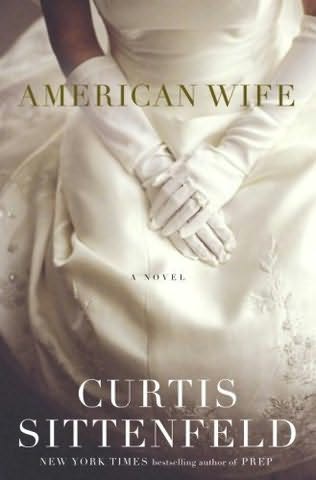 "Did I jeopardize my husband's presidency today? Did I do something I should have done years ago? Or perhaps I did both, and that's the problem -- that I lead a life in opposition to itself."
"Did I jeopardize my husband's presidency today? Did I do something I should have done years ago? Or perhaps I did both, and that's the problem -- that I lead a life in opposition to itself."American Wife is a novel that reads like an autobiography of a fictional First Lady - a woman whose life mirrors that of our own (for one more day) First Lady. Alice Lindgren is an only child growing up in the 1950s in small-town Wisconsin, the child of a middle-class upbringing. Her family includes an eccentric grandmother whose lesbian relationship with a family friend both drives a temporary wedge between her and Alice early on and plays a pivotal role in the book's final chapters. Alice's idyllic childhood ends when she kills her classmate and teenage crush in a car accident her senior year. The ramifications of that event and what happens after resonate throughout the book as Alice often imagines the dead boy to have been the love of her life.
Years later, while working as an elementary school librarian in Madison, Alice meets the charming and mischievous Charlie Blackwell at a friend's barbecue. The two begin a whirlwind courtship, which culminates in their engagement announcement at the end of a weekend visiting Charlie's privileged family, heirs to a meat-packing fortune and a Wisconsin political dynasty. Along the way, Alice finds herself promising to her fiance that though she, a registered Democrat and political progressive, may disagree with him privately at times, no one would ever know. Later on, Alice finds marriage to an overgrown frat boy to be trying, and leaves Charlie for a time when their daughter is young. It is during this separation that the future President stops drinking, finds Jesus, and starts the transformation into a serious political player.
The book skips from the middling years of the Blackwells' marriage and life in Wisconsin straight over Charlie's years as governor and president. The final section of the novel takes place in the waning years of President Blackwell's second term, when a series of events brings Alice's personal struggle with her husband's choices into sharper focus.
I've been a fan of all of Sittenfeld's books, but I found it refreshing that she departed from her usual introspective view in this latest novel. Unlike Prep and Man of My Dreams, any pieces of the author to be found in the character of Alice are largely overshadowed by Alice's resemblance to First Lady Laura Bush and her own life story. Although most of the book is probably fiction, anyone remotely familiar with the basics of Mrs. Bush's life story will recognize her in this character. The car accident, the job as a librarian, the political party affiliation early on in her life and the marriage into a political family all come directly from the facts of the First Lady's life.
Interestingly, Sittenfeld cites Ann Gerhart's The Perfect Wife: The Life and Choices of Laura Bush as a major influence on her novel. I've read that book too, and the bones that make up Sittenfeld's story are all taken directly from actual biographical events. It is easy to imagine this book springing from a character development exercise undertaken by Sittenfeld on a bored winter afternoon. Enough imaginative fluff is added to make the reader sympathize with the character of Alice, who like our own First Lady enjoys a popularity well surpassing that of her husband. Those of you who don't care to imagine the gory details of a First Lady's sex life should probably skip this book. So too should those who want to continue to direct their anger with the current administration at the entire Bush family. Sittenfeld does an excellent job of creating a character with whom readers can sympathize, and she deftly manages to do so without creating a victim. This book makes me eager to read Mrs. Bush's forthcoming memoirs.

4 comments:
Does creating a fictional representation of a real person make you uncomfortable? It does me, a little bit.
Or does the fact that it's a person with such a high public profile make it okay? Does agreeing to be the First Lady mean you are precluded from criticizing the fictionalization of your life? Or would this be okay for GWB in a way that it's not okay for Laura?
My criticism of this book is that Curtis Sittenfeld is assigning feelings to what is basically a real person. Her thinly disguised main character wrestles with her decision to marry a man whose ideals are in direct opposition to hers. Who is to say that the real First Lady really feels this way at all? It's a pretty huge assumption.
Sittenfeld freely admits in a forenote to the book that it is based on Laura Bush. It's basically a biographical piece that doesn't adhere to any rules of journalistic integrity that would be assumed if only the character were named "Laura Bush" instead of "Alice Blackwell."
There's a play about Laura Bush agonizing over GWB's decision to go to war in Iraq; I wish I could remember what it was called.
I don't think it's OK whether it's the first lady or the president. It just seems lazy to bastardize the biography of someone who's so much in the public eye. It comes off, to me, as a gimmick to preach either discontent with the president by exposing his imagined inner life, or to try and lobby for sympathy for the first lady by doing the same.
Post a Comment